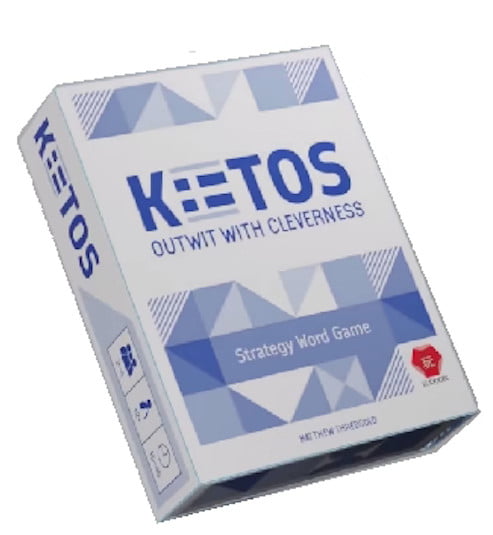Kiitos’ rules are so simple explaining them doesn’t really give you a feel for the game as it plays. The simplest explainer is that it’s a trick taker version of scrabble. You have a hand full of cards with some letters on them. You put down a card with a letter on it, then you say a word that starts with that letter, and then pass it to the next player. If they have the next letter in their hand, they have to play it into the word. In so doing, everyone builds on this word until it’s done, and when that happens, the person who set the word originally says ‘kiitos,’ meaning ‘thank you,’ and then takes the cards and they won that round.
If you can’t continue the existing word, the default assumption is you then take the existing letters in front of you, and put them in front of you face down as your negative points – a ‘great job, loser’ pile of cards that indicate you’ve just hecked up in the worst kind of way, great job. Is there some way to escape this fate, though?
Why, yes — if you can’t continue the word with the cards in your hand, you might be able to add a letter and say a new word. And now suddenly someone may have started with the word BURP and you’ve elbow-shoved the table into BUDGET and what’s more, now they’re bound by the same rules – they have to continue the word if they can. They can’t just shove the word back when they get the chance because the word’s been deformed by definition.
And… that’s it! You play rounds until you stop. The game is incredibly simple, and yet brain-expandingly difficult when you understand the rules system.

I’ve held off on writing about Kiitos because as a games design, it’s so elegant and small that the fine details of its rules structure are hard to explain in text. You kind of have to play it, and learn the small things like how many letters of each type are in the deck. You can put down the word bubbles, which sounds reasonable in a four player game except there are only two Bs in the entire deck, meaning by definition, you’re trying to pull something on the table. There’s no Q, either, which shuts out a bunch of other words, but you can still choose those words, which is a bright, flashing sign of this is a trap.
Play emerges on its own as you start executing on these rules, and these rules are simple. This means that the complexity of the game becomes emergent from those rules in action. People don’t look at Kiitos from the outside and go ‘oh, I see how this goes wrong’ you sort of have to see it happen in front of you and the ways that words can be yanked away from you, or how the word you choose can give away what you probably have in your hand and get you bullied into completing someone else’s word.
I’ve said before that Scrabble is a game about area control. I’ve said that scrabble is a game you lose slowly, where once the game hits its end game it’s a matter of trying to minimise failures. I’ll also add to that that scrabble is slow and that slowness makes it brutal when you’re trying to find some way to make the game pivot. There aren’t a lot of means to trap or connive in Scrabble — not that the game lacks for strategy, but that the strategy present in the game is much more like chess, with move after move being projected out ahead of you. If they have this I’ll do this, kind of thing.
Kiitos on the other hand is nothing but conniving. It’s about forcing people into actions, either with the word starts they have to stick with or about taking command of the word with the information they’re leaking. It’s devious and on its own that would be enough of a reason to recommend it even if you already had other word-builder games you liked.
Here though is the most ringing endorsement I can offer of Kiitos. My mother and sister both like playing board games with me, but my mother prefers these abstract puzzle types than heavily themed pieces. She still understands systems, but things like elves and wars don’t spark her interest. I got her a copy of Kiitos for Christmas, correctly understanding she’d like it.
There I am, sitting at the living room table with my mum and sister playing this game, a few hands in a row… and then wordlessly, my dad sits down and watches. He just watches. And then after a few more hands, Dad asks if he can be dealt in.
And he proceeded to clean my clock.
Now I know my Dad is good at word games, but and this is important, I didn’t explain the rules to him. He watched us play, he watched the game, and he worked the rules out and proceeded to get the fundamental mechanics of the game so clearly he went from newcomer to shark.
I don’t think you could get that going with a game too much more complicated than this.
